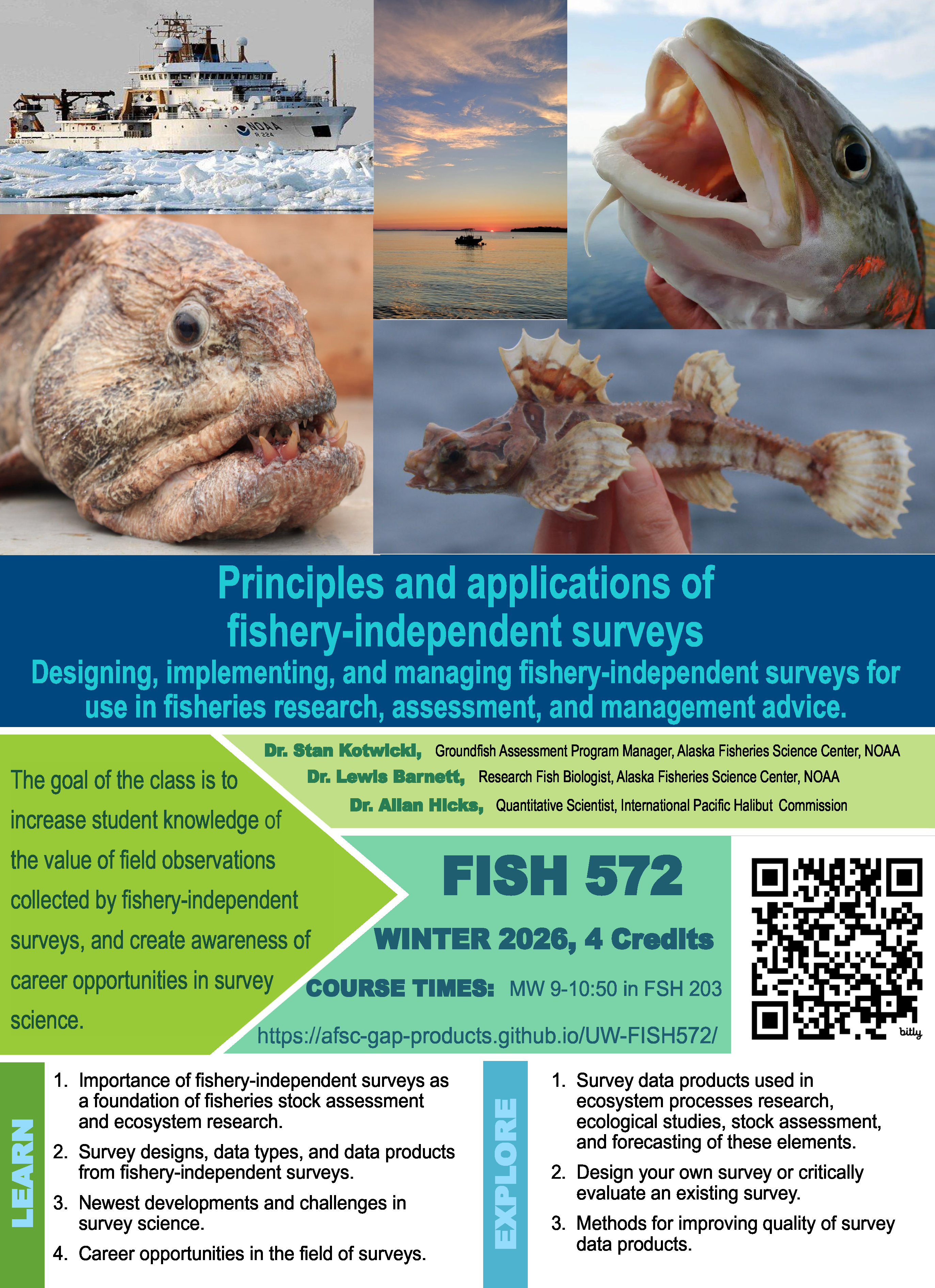UW FISH 572: Principles and applications of fisheries-independent surveys
Last run date: Monday, September 15, 2025
Principles and applications of fisheries-independent surveys is a 4-credit course (FISH 572) that delves into the importance of fisheries-independent surveys as a cornerstone for fisheries stock assessment and ecosystem research.
Please consider this resource to be a Living Document. The code in this repository is regularly being updated and improved. Please refer to releases for finalized products and project milestones.

0.1 Instructors
Dr. Stan Kotwicki, Groundfish Assessment Program Manager, Alaska Fisheries Science Center, NOAA. Stan.Kotwicki AT noaa.gov
Dr. Allan Hicks, Quantitative Scientist, International Pacific Halibut Commission. Allan.Hicks AT iphc.int
Dr. Lewis Barnett, Research Fish Biologist, Groundfish Assessment Program, Alaska Fisheries Science Center, NOAA. Lewis.Barnett AT noaa.gov
0.2 Class Teaching Assistants
Dr. Sophia Wassermann, Research Fish Biologist, Alaska Fisheries Science Center, NOAA. Sophia.Wassermann AT noaa.gov
Emily Markowitz, Research Fish Biologist, Alaska Fisheries Science Center, NOAA. Emily.Markowitz AT noaa.gov
0.3 Course Summary
The course covers the science and practice of fishery-independent surveys, the primary monitoring approach supporting fisheries management. Fishery-independent surveys form the foundation for stock assessments and ecosystem research, which will be exemplified by case studies from the field. The course covers survey designs for different objectives, types of data collections, and data products from fisheries-independent surveys. It explores the newest developments and challenges in survey science, from observation to spatial and temporal analysis, and introduces career opportunities in the field of scientific surveys. Practical challenges in implementing these principles and managing fisheries-independent surveys will be discussed. You will learn how survey data products inform marine research, stock assessment, ecosystem analysis, and ultimately accumulate into fisheries management advice.
This course is designed for students with a background in basic statistics, statistical modeling, and fisheries/wildlife science. It covers a wide range of topics, including:
- Survey Design: Learn about various survey designs for different objectives, types of data collection, and the resulting data products.
- Data Analysis: Gain practical skills in analyzing fisheries-independent survey data using both design- and model-based methods.
- Current Topics: Explore the latest developments and challenges in survey science, such as uncertainty, survey continuity, effort optimization, flexible survey design, and the use of statistical tools and new technology.
- Real-World Applications: Understand the logistical challenges in implementing and managing fisheries-independent surveys, and how survey data products are used in fisheries research, assessment, and management advice.
- Career Opportunities: Discover career paths in the field of research surveys.
The course format includes lectures from instructors and visiting experts, student-led literature reviews and discussions, and hands-on survey data analysis. A significant portion of the grade is based on a final research project using survey data, providing students with valuable experience in research planning and execution. This class is designed to provide useful skills for ongoing research in the field.